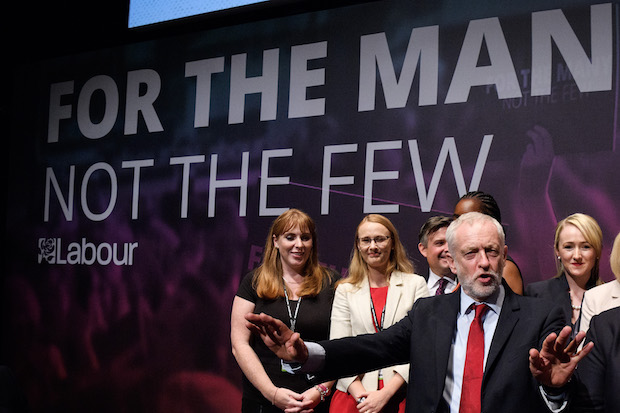When Jeremy Corbyn gave his speech on Wednesday, the conference hall bore a closer resemblance to a stadium concert than your bog-standard political meeting. The Labour leader was given a hero’s welcome from party members decked out in Corbyn fan merchandise. He received a standing ovation before he’d even emitted a word, and an impromptu chant of ‘Oh, Jeremy Corbyn’ soon followed.
Corbyn’s position has never been more secure and this year’s conference has only gone to cement the new normal for Labour – it is a loud and proud socialist party. Buoyed by the snap election, MPs and members alike have embraced Corbyn’s anti-austerity narrative – no-one is having a ‘friendly’ debate over how best to balance the books anymore.
It’s this newfound confidence in Corbynism since the snap election that has led to a bolder and more radical approach in the policies and tone the leadership is now adopting: mass nationalisation, rent controls and a shift in foreign policy. Ahead of the Tories in the polls, senior Labour figures don’t seem particularly worried about warnings from the CBI that these policies ‘will send investors running for hills’. In fact, John McDonnell is so relaxed about the whole thing that he told a fringe event Labour were preparing for ‘a run on the pound’ when elected.
As things stand, Labour are narrowly ahead of the Conservatives in the polls – they need another 64 seats at the next election to have a majority. There are some in the party who are now asking: is 21st Century socialism really the new mainstream or is it a miscalculation of the public mood? When it comes down to it, will voters plump for Corbyn’s radical vision for a socialist Britain? As one MP remarked, ‘I worry that we’re heading for a result like in 1992’. In that election, the Conservatives – the governing party – defied expectations and won even though Neil Kinnock’s Labour had consistently polled ahead.
Corbyn wants to use the Conservative turmoil over Brexit to push his own radical agenda through. The uncertainty of Brexit means voters could be less risk averse in the next election. If the pound has plunged anyway because of Brexit, why not let McDonnell organise a second run on the pound in the name of ‘the many not the few’? But it is a gamble on Labour’s part. After all, it wasn’t so long ago that Theresa May discovered the danger of believing your opposition is so weak that you can do whatever you want.







Comments